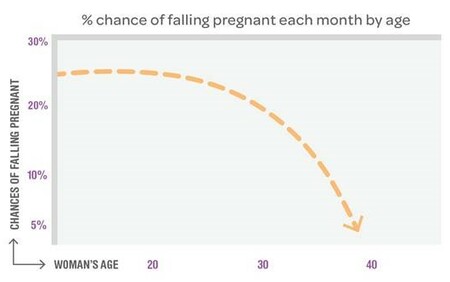Age and Female Fertility
The single most important factor influencing your chance of conceiving is a woman’s age.
What age are women most fertile?
Once you turn 36, your chance of conceiving naturally is halved compared to your chance at 20 years of age. At the age of 41, this chance falls to just 4%. That’s the success rate for couples per month of trying when the female is aged 41 to 42.
Why is this? While a woman is born with 2 million eggs, these are the only eggs she will ever have. By the time she hits puberty that number has already dropped to 400,000. And as age progresses, the egg quantity and quality continues to decline.
Men are at less of a disadvantage when it comes to age and infertility, but should still be aware that there is a relationship between the two. The fact is, male factors contribute to over 40% of all infertility cases. While some of these issues can be lifestyle related, abnormalities and low counts caused by other issues can play a role, including age. Learn more about the factors contributing to male infertility.
While we can’t stop or reverse the ageing process, there are positive steps both genders can take to boost fertility and a successful pregnancy.
The decline of fertility overtime
The reason that women in their late 30's and 40's have a lower chance of conceiving is that the number of healthy eggs you produce rapidly declines as you get older, especially after the age of 36. The number of eggs available to go through the maturing process will be lower still if you experience premature menopause, or need to undertake chemotherapy treatment.
The risk of miscarriage also increases with age. As you get older, your cells start to divide abnormally and may distribute unequal amounts of genetic material – causing an increased chance of chromosomal variations. Unfortunately, this means that for older women it’s not just more difficult to fall pregnant, there is also a greater risk of miscarriage, and a higher possibility of having a child with a genetic variation such as Down Syndrome.

Get the facts on fertility
Age and fertility myths
If you were to believe everything you see in the media, you’d be forgiven for thinking that it’s reasonable to expect a child in our 40’s. Unfortunately, things aren’t quite that simple for most couples. It’s worth being aware of a few myths around age and fertility:
- Myth 1: Women are just as likely to conceive in their 30’s as they are in their 20’s – Not true.
As you can see in the chart on this page, women in their 30’s will start to see a decline in their chances of natural conception per month – especially past the age of 35.
This is why we recommend that if you’ve been trying to conceive for 12 months under the age of 35, or 6 months if you are over 35 years of age, you should consider seeking the advice of a fertility specialist.
- Myth 2: Being fit and healthy can help slow the rate that your fertility declines due to age – Not true.
This is a very common misconception. Unfortunately, even the healthiest individuals who exercise regularly, eat well, etc. will still find that their egg count and quality declines as they age. Lifestyle factors can help boost your fertility, however, the number one factor that determines egg count and quality is age.
- Myth 3: Your chances of getting pregnant naturally are still good in your early 40’s – Not true.
Unfortunately, this is not the case. At the age of 41, the chance falls to just 4%.
- Myth 4: It’s easy to get pregnant in your 40’s with IVF – Not true.
Although assisted reproduction does improve your chances of conceiving and carrying a child, it’s important to be aware that age is still a highly important factor in IVF success. Read more about our success rates, broken down by age, here.
Assisted conception can help
The good news is that with advances in reproductive technology, including IVF and other forms of assisted conception, you can improve your chances of conceiving and carrying a child. Here are a few examples – visit our Fertility Services pages to find out more.
IVF
If you use IVF or other assisted reproductive technology, you can increase your chances of falling pregnant. If you are aged 36 to 40, your chance of falling pregnant with IVF is 35%, compared with 10% if trying to conceive naturally.
Genetic testing
Pre-implantation Genetic Testing (PGT) is a method of testing embryos for specific genetic and chromosomal abnormalities before implantation. We can also select the embryo with the greatest chance of pregnancy success.
Fertility preservation
A woman’s most fertile years are when she is in her 20s and early 30s. It is now possible to store unfertilised eggs for use in the future, using egg freezing. For women who are not in a position to become pregnant, or whose fertility is at risk due to serious illness, this relatively new technique offers the potential to have a family later in life.